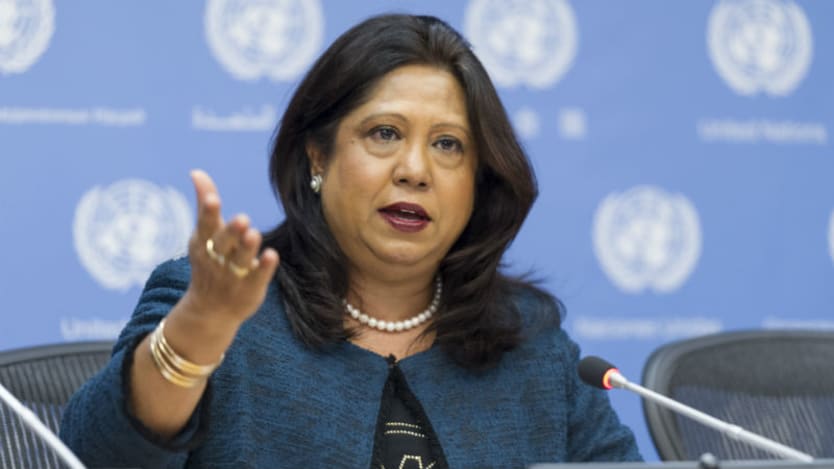
UNITED NATIONS — Bangladesh’s government is coping for now with an influx of Rohingya refugees who continue to flee Myanmar, but the host country’s limits are being tested, United Nations special representative Pramila Patten said.
“I think the government of Bangladesh is to be commended for containing the situation, but for how long? That is the huge question,” Patten, the U.N. secretary-general’s special representative on sexual violence in conflict, said in response to a Devex question at a news briefing late last week.
“We are talking about camps accumulating something like 1.2 million people — if you think of the Rohingya community that came last year and before that — all in a fairly small space, so it is very congested. There is a shortage of space, and a lack of capacity and a lack of funding,” she said.
Patten, who was appointed to her post in April, also called for an independent investigation into systematic use of sexual violence in Myanmar, which she said was “used as a tool of dehumanization and as a form of punishment.” The crimes appeared to be condoned by the armed forces of Myanmar, she said.
Patten spoke to U.N. journalists following a mid-November trip to several refugee camps set up in Cox’s Bazar, Bangladesh.
“No one was spared — men, boys, women, girls, babies, and the elderly. The forms of sexual violence we consistently heard about included gang rape by soldiers, sexual slavery, and military captivity. And, in fact, many still bore scars and bite marks attesting to their ordeal,” she said.
The U.N. Human Rights Council is set to hold a special session on killings, rapes, and other crimes committed against the Rohingya in Myanmar, Reuters reported on Monday.
About 625,000 Rohingya — who are a Muslim minority in Myanmar — have fled to Bangladesh since August, according to U.N. figures. U.S. Secretary of State Rex Tillerson said last week that Myanmar’s expulsion of the Rohingya people constitutes “ethnic cleansing” — a claim previously backed by the U.N. human rights chief, and endorsed last week by Patten.
Patten said a request to visit Myanmar was denied. She said she was surprised by the openness of the women and girls, who shared “shocking accounts of abuses,” which included babies being taken and burned.
“I can fully understand why the U.N. high commissioner has described it as [ethnic cleansing] and can also see the basis for characterizing these violations as war crimes and crimes against humanity,” said Patten. She explained that while it is not her role to make that assessment, there is a case for pursuing these atrocities in international courts.
The difficult topography of some of the camps has made access difficult for aid, as Devex recently reported. But Patten did pay tribute to current efforts in Bangladesh to cope with the crisis and said the “host community deserves a lot of credit.” However, she also added that the relief effort might not be sustainable in face of the challenges of the crisis. “They are stretched to [the] limit to provide basics of health and water and shelter.”
Patten said she hopes to brief the U.N. Security Council on her findings soon.
Read more Devex coverage on the Rohingya crisis.
Read more stories on the Rohingya crisis:
► In troubled Rakhine state, access slowly begins opening up again
► In Bangladesh, did groups build emergency latrines for Rohingya refugees — or for donors?
► An alternative to 'refugee camp, then repatriation' strategy for Rohingya crisis?
► In Geneva, governments applaud Bangladesh, fall short on UN Rohingya appeal
► Humanitarian agencies lobby against Rohingya 'mega camp' creation
Search for articles
Most Read
- 1
- 2
- 3
- 4
- 5
